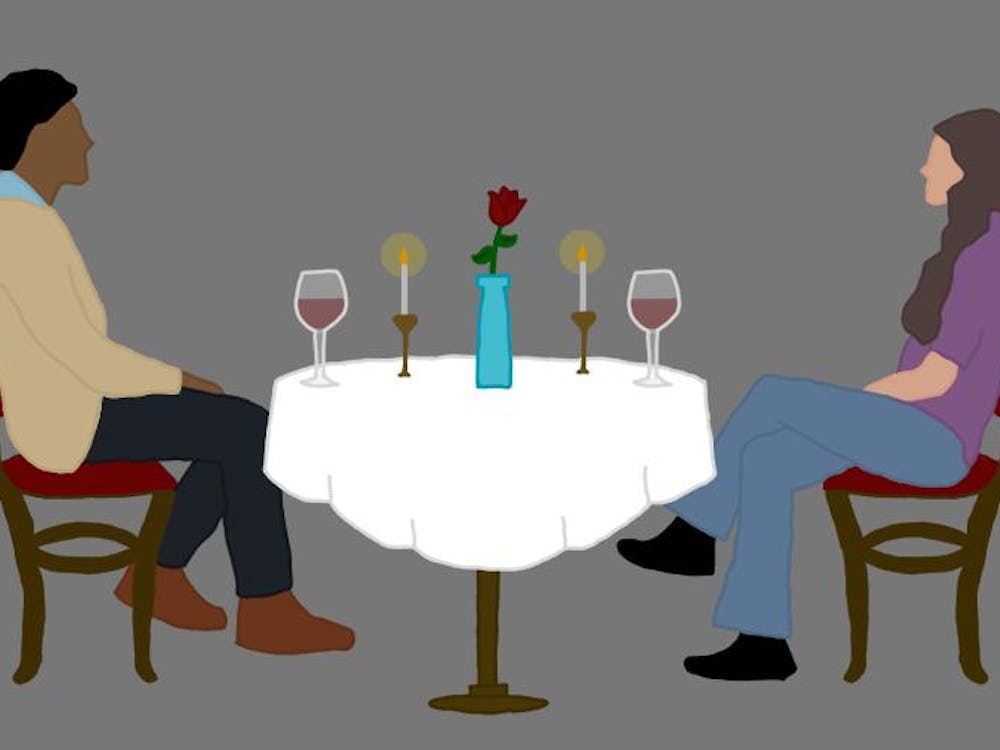The dark labyrinth of the bottom floor of Culbreth Theatre winds past a wall of long, flowing, black curtains and past a set of double doors, ending in a dimly lit narrow corridor that stops abruptly at yet another set of doors through which it all begins. Here gathers the cast of "Twelfth Night."
Here, in the brightness of the rehearsal room, whose size resembles that of a large classroom, with walls covered by either black cloth curtains or rusty ballet bars and a floor that reveals layers of multicolored tape, 20 or so young theater artists form a misshapen circle and give their attention to a figure standing in their midst.
This leader, usually a fourth-year or graduate student, proceeds to run the rehearsal's half-hour warm up session. Warm ups vary at each practice, depending on who leads on any particular night, but they usually end in an exercise involving lines from Shakespeare's texts, according to fourth-year College student Caroline Pugliese.
Indeed, after 37 jumping jacks, making "lion" and "lemon" faces, and other physical and vocal exercises, cast members played a round of Shakespeare tag in which the "it" person shouted lines from any text of Shakespeare while chasing others.
"We do physical warm-ups [because] Shakespeare is actually pretty athletic -- you have to be ready for all facets," Graduate Arts & Sciences student Karie Miller said.
Following the first half-hour of practice, the group divides. While a small portion of the cast remains behind to rehearse individual scenes with the director, the majority venture through the darkness, past the rehearsal of "Hedda Gabler" in Helms Theater, into the lobby and beeline for the sofas against the wall.
As members sink into the sofas and wait for their calls into the rehearsal room, they seem unperturbed by the activity occurring at the opposite end of the lobby, where some performers of "Hedda Gabler" await their cues or periodically come in and ask for silence.
"There are people rehearsing in every part of this building," Graduate Arts & Sciences student Autumn Shiley said. "You're never really prepared. If you walk into the building, [you can hear] people screaming 'Ride the horse!' or singing or shouting."
The lobby of Culbreth is no exception.
"I feel like it's a little more open, and the things we come up with out here we take into the rehearsal space as suggestions," second-year College student Danny Cackley said of sharing the lobby space with "mutual colleagues."
Soon artists pair off and work with one another to review lines or to try alternative methods of performing a specific action. Or, members break off entirely from the others and rehearse individually in a corner.
Preparation does not simply end there, however; the early stages of production are also dominated by line memorization.
Although memorization techniques differ among performers, from reading the text before going to bed to writing out the lines as one remembers them, all cast members can then bring their own creativity to the playwright's words upon learning their lines and sequence of actions.
"I think memorization is the easiest part," Shiley said. "The fun part comes when you know the lines so well that you can be spontaneous in the moment."
Through these efforts, the end product culminates in a display of the writer's original intent combined with fresh artistic innovation.
"A big misconception is that we don't do work, that we play more than work," third-year College student Harrison Gibbons said. "Not only do we work, we have a strong work ethic. We're doing this work because we want to and feel the need to."
Such a commitment to work, which will result in almost two months of three to 3.5 hour practices Sunday through Friday nights, has allowed the performers to develop a deep sense of camaraderie.
"The great thing about theater is that this is a show about an ensemble; people are working together to create something, and what that creates is a real sense of trust," Cackley said. "I trust everyone in this cast, and people I don't know that well I'm getting to know better. We all make that effort. As soon as we trust each other completely, then that's when the really interesting stuff happens. That is when we feel completely free to bring all of our ideas to the table and to let loose, in a way."
Furthermore, also common among the cast of "Twelfth Night," appears to be the notion that all are equally important to the show. As such, "prima donnas" do not exist within this circle of performers, or in the drama department in general, Gibbons said.
"We work much better with the mindset that no one person is more important than the other," he added. "Everyone is important -- the person who sweeps the floor before the show is important ... It kind of makes the old saying 'There are no small parts, just small actors,' ring true."
The exhibition of the play Nov. 29 will mark the theater's first production of a Shakespeare play since "As You Like It" in 2003. Though the audience can expect the Elizabethan language characteristic of Shakespeare plays, it can look forward to a modern costume design.
The idea behind this costume design rests on the impression that the wealthy aristocrats in "Twelfth Night" had donned the finest clothing during Shakespeare's time; to equate the image in modern society and to allow the audience to relate easier to the characters, costumes will feature elements of high fashion, such as Dolce and Gabbana and Louis Vuitton-style coats and vests, in place of 16th-century dress, according to Cackley.
Despite the lack of breeches and doublets, "I think it's great the way it keeps the integrity of [the] language with only a few small cuts," Cackley said. "It's still accessible to college students, [and] as opposed to seeing costumes and props, [it's] what people see on MTV."
As such, attire is custom-designed with the cast member behind the character in mind, and many physical changes, such as changing one's hair length or color, must first be approved by the costume designer and the director, who sets the style of the show, Cackley said. Together, all of the effort the performers put forth in preparation enables them to create a community of artists who work hard to do what they love.
"We challenge each other to be better theater artists, which is what theater artists should do," Gibbons said. "That may sound weird when a lot of people are just working for the grade or resume credit, but here, we're doing it because it makes us feel more alive. It enriches us more than the extra three and a half hours a day every Sunday through Friday"






